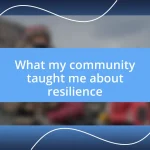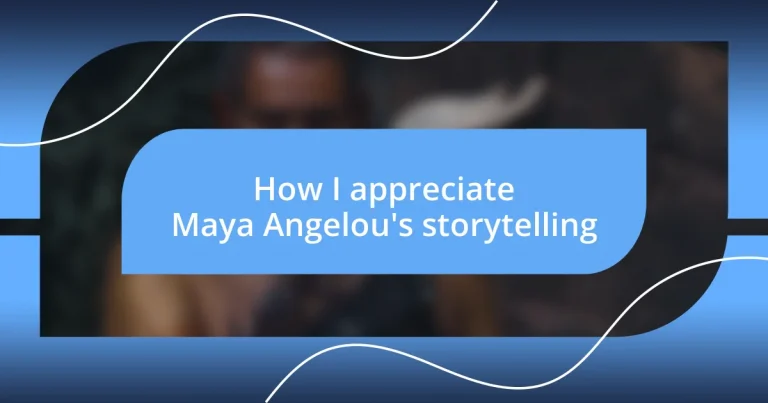Key takeaways:
- Maya Angelou’s storytelling emphasizes themes of resilience, identity, and social justice, inspiring readers to confront their own experiences and advocate for change.
- Key elements of her style include vivid imagery, emotional resonance, rhythmic language, and personal anecdotes, which create an immersive and relatable narrative experience.
- Sharing Angelou’s stories fosters connection and empathy, sparking conversations that help individuals heal and understand their own journeys and those of others.
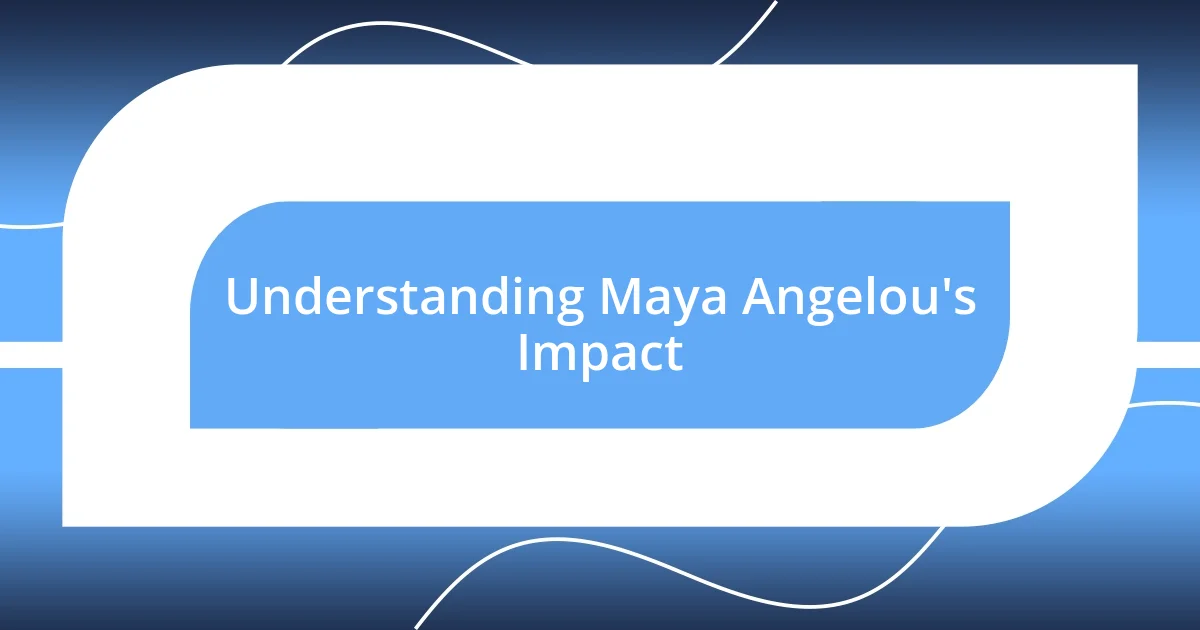
Understanding Maya Angelou’s Impact
Maya Angelou’s storytelling has the power to transcend ordinary narratives, weaving together themes of resilience, strength, and identity. I remember the first time I read “I Know Why the Caged Bird Sings.” The way she articulated her experiences made me feel as if I was walking alongside her, experiencing every moment of pain and triumph. It’s no wonder that her work resonates deeply with so many; she held up a mirror to society, inviting us to reflect on our values and beliefs.
Angelou had an uncanny ability to connect with her audience on a personal level, often asking readers to confront their own truths. Her poignant line about the caged bird yearning for freedom prompts an unsettling question: How often do we feel trapped in our own lives? I found that her words encouraged me to look beyond my circumstances, igniting a fierce desire to break free from limitations. This emotional connection is a hallmark of her legacy—one that continues to inspire both writers and readers alike.
Furthermore, her impact extends beyond literature; it touches on social justice and civil rights. The passion in her voice during public addresses reverberates to this day, echoing the struggles of those marginalized. I often find myself asking, how can we harness her wisdom to advocate for change today? Angelou’s storytelling reminds us that, though our struggles differ, our quest for justice and understanding unites us all.

Elements of Her Storytelling Style
Maya Angelou’s storytelling is marked by a melodic cadence that captures the ear. When I first listened to her recite “Still I Rise,” the rhythm of her words resonated with me like a powerful song. This lyrical quality invites readers to savor each line, allowing the emotion to seep in, much like a rich atmosphere you can almost touch.
Key elements of her storytelling style include:
- Vivid Imagery: Angelou paints detailed pictures that draw you into her world, making abstract feelings tangible.
- Emotional Resonance: She doesn’t shy away from vulnerability; her honesty connects deeply with readers’ own experiences.
- Cultural References: Infusing her narratives with historical and cultural context enriches the storytelling, grounding her messages.
- Rhythmic Language: The musicality of her prose creates an immersive experience, making her work memorable.
- Personal Anecdotes: Sharing her life stories invites readers to see the universality of her struggles and triumphs, fostering a sense of understanding.
Each of these elements enhances the reader’s engagement, creating a narrative experience that feels both personal and profound.

Themes in Maya Angelou’s Works
Maya Angelou’s works often explore the theme of resilience, capturing the human spirit’s ability to rise against adversity. I remember reading her account of overcoming childhood trauma, and it struck me how she transformed pain into poetry. Her narrative not only tells her story, but also sparks a fire within us—inviting us to embrace our own struggles and emerge stronger.
Another prominent theme is the search for identity, particularly from the perspective of a Black woman in America. Her exploration of self-acceptance resonates deeply, reminding me of my own journey in grappling with cultural identity. I found solace in her reflections on belonging, as they encouraged me to celebrate my uniqueness rather than hide it.
Lastly, the theme of social justice permeates her storytelling. Angelou did not shy away from discussing systemic injustice; instead, she elevated the voices of the marginalized. I often reflect on her famous lines about freedom and justice, feeling a renewed sense of responsibility to stand up for those who remain unheard. Her unwavering commitment to equality serves as a powerful reminder that our collective stories shape our world.
| Theme | Description |
|---|---|
| Resilience | The power of the human spirit to overcome adversity. |
| Identity | The exploration and acceptance of one’s cultural and personal identity. |
| Social Justice | Advocacy for equality and empowerment of marginalized voices. |
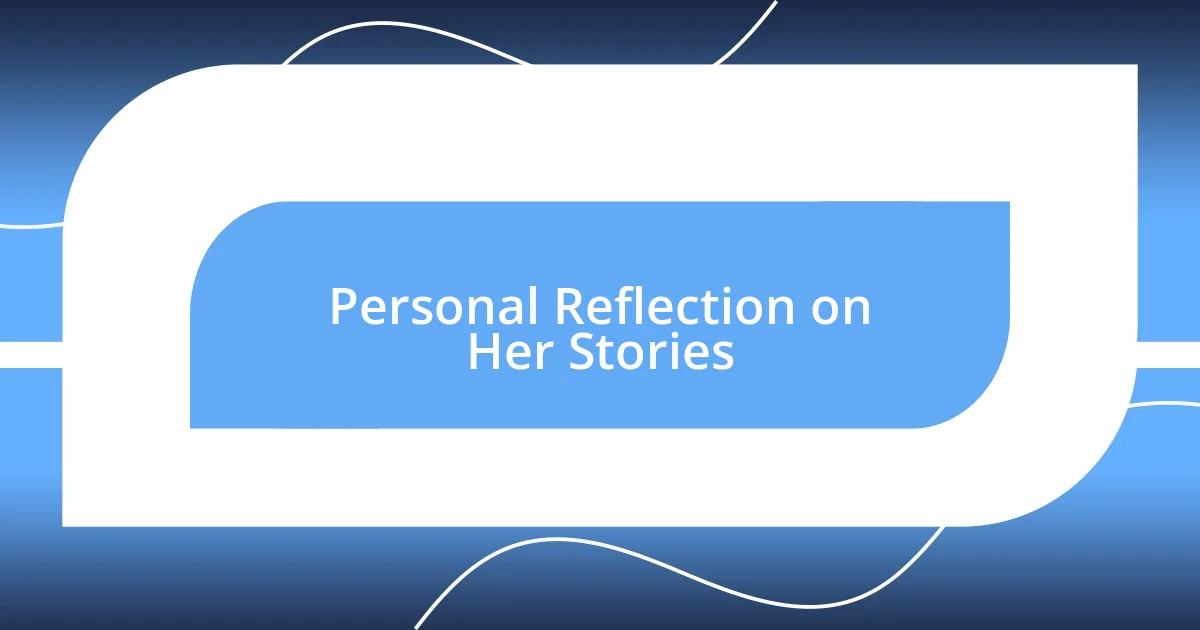
Personal Reflection on Her Stories
When I reflect on Maya Angelou’s stories, I’m often reminded of my own experiences with overcoming challenges. Her powerful narratives resonate with me in moments of self-doubt. I remember one particularly tough time in my life when her poem “Phenomenal Woman” served as a source of inspiration. It made me realize the importance of embracing my own strength, no matter my circumstances. Have you ever felt empowered by someone else’s words? That sense of connection can truly transform you.
The way Angelou weaves vivid imagery into her storytelling captivates my imagination. I can almost feel the warmth of the sun on my skin when she describes her childhood in St. Louis. It transports me to a time and place that feels both distant and relevant, a reminder that our past shapes who we become. In my own life, I find that the moments I’ve revisited through story—whether through personal writing or shared conversations—have illuminated my journey. How has your perspective changed when you revisited a memory?
I also value the raw honesty in her narratives, which resonates deeply within me. When she recounts her experiences with loss and heartache, it feels almost as if she’s holding my hand and guiding me through my own struggles. There’s an authenticity in her voice that encourages me to embrace my vulnerabilities. Her courage to share her truth makes me ponder: what would happen if we all spoke our truths unapologetically? I find that idea empowering—something we could all benefit from embracing in our own storytelling.
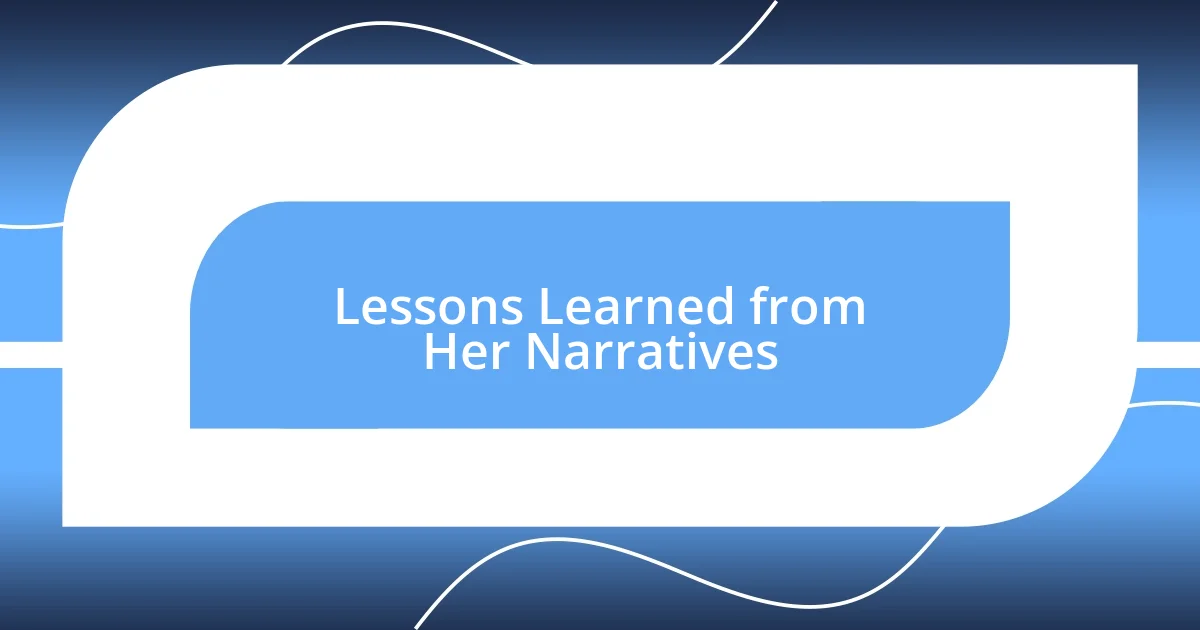
Lessons Learned from Her Narratives
In reflecting on the lessons learned from Maya Angelou’s narratives, I often think of the power of vulnerability. Her willingness to share her deepest struggles taught me that opening up can foster connection and understanding. I remember a time when I hesitated to share my own story of loss, but Angelou’s words encouraged me to take that leap. Have you ever felt that sharing your truth could change someone’s perspective? It’s incredible how authenticity can create a bridge between our experiences.
Another important lesson is the significance of perseverance. When I read about Angelou’s journey from trauma to triumph, I felt a surge of motivation to tackle my own obstacles. It makes me wonder—what if we all adopted that same spirit of resilience in our lives? Her ability to transform adversity into wisdom serves as a powerful reminder that our stories can inspire not just ourselves but others, too.
Moreover, Angelou’s narratives highlight the importance of community. I find that her emphasis on shared experiences can unify us in ways we often overlook. For instance, during community discussions, I’ve witnessed how fostering dialogue around personal stories can lead to profound understanding and solidarity. Do you think we sometimes forget the power of collective storytelling in creating change? Her work definitely motivates me to engage more deeply with the stories of those around me, recognizing that every narrative holds a key lesson for all of us.

Ways to Incorporate Her Techniques
Maya Angelou’s storytelling techniques can easily be embraced in our own writing by focusing on vivid descriptions. When I think back to a recent travel experience, I remember trying to capture the essence of a sunset I witnessed—a cascade of fiery oranges and soft pinks that painted the sky like a masterpiece. By using sensory details, just as Angelou does, you can transport your reader to a place where they can feel the warmth and experience the scene, making the story unforgettable.
Incorporating her raw honesty is another powerful technique. I’ve had moments in my writing when I hesitated to share my genuine feelings, fearing judgment or misunderstanding. But reflecting on Angelou’s fearless vulnerability inspires me to push through those fears. Have you ever considered what might flourish if you were open about your struggles? By sharing authentically, we invite others into our lives, fostering real connections that can lead to healing and understanding.
Finally, weaving personal anecdotes into your narratives can significantly enrich your writing. I recall a time when I shared a childhood memory at a family gathering, and the emotion it stirred in everyone created an unspoken bond. Angelou excels at this; her stories often resonate on multiple levels because they draw from her life experiences. What might you gain by bravely sharing your own stories? Using personal tales can bring depth and relatability to your work, encouraging readers to reflect on their own journeys while forging a lasting connection.
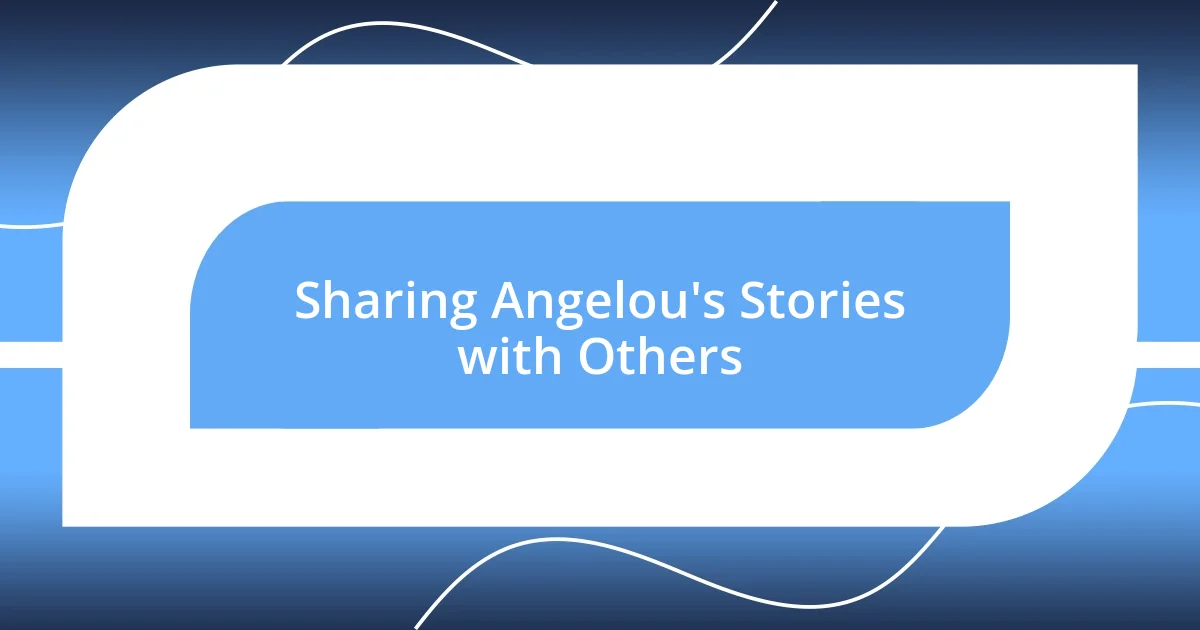
Sharing Angelou’s Stories with Others
Sharing Maya Angelou’s stories with others goes beyond mere conversation; it’s about creating connections. I remember sharing an excerpt of her poem during a book club meeting. The discussion that followed was electric—people opened up about their own struggles and triumphs. Isn’t it fascinating how one story can prompt a cascade of personal revelations?
Moreover, I’ve found that sharing Angelou’s narratives in workshops can transform the atmosphere entirely. When I facilitated a storytelling session inspired by her work, the participants felt liberated to express their vulnerabilities. I watched as their faces lit up while recounting experiences that had weighed them down for years. How powerful is it that a single storytelling moment can lead to such healing?
Finally, I often encourage friends to recognize the beauty in recounting Angelou’s tales in casual settings. One evening, I shared her story of resilience at a dinner party, and it ignited heartfelt conversations. It struck me how easily storytelling nurtures empathy; when we hear someone else’s journey, it’s as if we momentarily step into their shoes. Could this be a key to fostering deeper connections in our lives?




